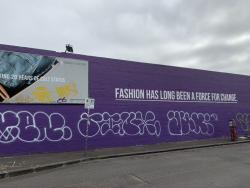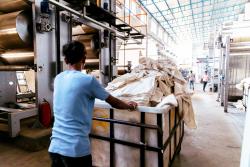Enhancing environmental and social sustainability of global production and consumption of textiles and garments.
The global textile and garment supply chain has a high environmental and social cost – the sector contributes six per cent of global carbon emissions; production activities use water, land and chemicals intensively; and the sector contributes to enormous amounts of waste water and social waste through production and consumption cycles.
Waste textiles represent a complex and rapidly increasing waste stream that is challenging to recycle. Many workers in the sector also have precarious working conditions. Helping the sector meet climate targets and the Sustainable Development Goals will require a green and just transition.
ISF brings a systemic perspective to these issues and has undertaken international and local research, investigating the environmental governance of garment production in Asia, as well as waste textile generation and the drivers for sustainable fashion in Australia. This has included responsive research examining the impact of the pandemic on sustainability transitions in the fashion sector.
PROJECT | 2021-2022
Wellbeing wardrobe
The European Environmental Bureau (EEB) commissioned a team from ISF, Erasmus University Rotterdam and Lund University to develop the concept of a 'Wellbeing Wardrobe' – a fashion and textiles industry that is oriented towards a Wellbeing Economy
PROJECT | 2021
Sustainable Fashion in Australia and sectoral resilience during the pandemic
ISF examined the enablers and barriers to sustainability transitions in the Australian fashion industry, through interviews with fashion designers, retailers, industry associations and consumers. We have also examined the impact of the COVID-19 pandemic on the industry with regard to sustainability initiatives.
Our preliminary findings highlighted the importance of domestic garment manufacturing in supporting sectoral resilience, as well as the creativity of fashion designers in pivoting collections to meet changing consumer demands. Sustainability commitments – both social and environmental – increased during this time. This research identified implications for traditional and online retailing and the need for further investment in manufacturing capabilities, as well as gaps in Jobkeeper supports for new businesses.
This research was conducted in collaboration with Dr Lisa Heinze (University of Sydney). The first findings were published in Geographical Research. Dr Brydges and Dr Retamal have also co-authored related publications on the impact of the COVID-19 pandemic on the sustainability in the fashion industry in Sustainability: Science, Practice and Policy, as well as The Geographical Journal. Dr Brydges published a commentary (with Dr Mary Hanlon) on garment workers in Dialogues in Human Geography.
Researchers: Monique Retamal, Taylor Brydges
RESEARCH OUTPUTS
Changing geographies of fashion during Covid‐19: The Australian case (2021) (Journal Paper)
Geographical Research
Platforms and the pandemic: A case study of fashion rental platforms during COVID‐19 (2020) (Journal Paper)
The Geographical Journal
Will COVID-19 support the transition to a more sustainable fashion industry? (2020) (Journal Paper)
Sustainability: Science, Practice, Policy
Garment worker rights and the fashion industry’s response to COVID-19 (2020) (Journal Paper)
Dialogues in Human Geography
PROJECT | 2019-2022
Decent work and environmental sustainability of textile and garment supply chains in Asia
Enhancing the environmental sustainability of key actors in the textile and garment sectors.
Researchers
-
Program Lead - Course Development
-
Research Director
-
Research Principal







